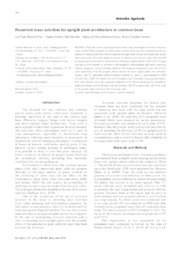Recurrent mass selection for upright plant architecture in common bean.
Recurrent mass selection for upright plant architecture in common bean.
Autoria: PIRES, L. P. M.; RAMALHO, M. A. P.; ABREU, A. de F. B.; FERREIRA, M. C.
Resumo: Plant with a more upright architecture offers many advantages to farmers. Recurrent mass selection (RS) programs for carioca type common bean have been implemented for the purpose of obtaining new lines that will generate the high yields that are associated with upright plant archi tecture. This study aimed to assess the efficiency of recurrent mass selection (RS) for upright plant architecture in common bean (Phaseolus vulgaris) and the effect of RS on grain yield and to verify whether or not there is still variability in the population that favors continuing selection programs, using information obtained from progenies evaluated in cycle five (CV) and cycle eight (CVIII) of the RS program. Mass selection for more upright plants was performed visually in the "S0" generation before flowering. Progenies S and Swere evaluated in 2009 (CV) and 2011 (CVIII). Heritability (h2;) and RS progress were estimated using adjusted means. After eight selection cycles, the population subjected to RS still had enough genetic variability to achieve continued success through recurrent selection. The RS progress was 1.62 % per cycle for the growth habit scores and 6.81 % for grain yield.
Ano de publicação: 2014
Tipo de publicação: Artigo de periódico
Unidade: Embrapa Arroz e Feijão
Observações
1 - Por padrão são exibidas publicações dos últimos 20 anos. Para encontrar publicações mais antigas, configure o filtro ano de publicação, colocando o ano a partir do qual você deseja encontrar publicações. O filtro está na coluna da esquerda na busca acima.
2 - Para ler algumas publicações da Embrapa (apenas as que estão em formato ePub), é necessário ter, no celular ou computador, um desses softwares gratuitos. Sistemas Android: Google Play Livros; IOS: iBooks; Windows e Linux: software Calibre.
Acesse outras publicações
Acesse a Base de Dados da Pesquisa Agropecuária (BDPA) para consultar o acervo completo das bibliotecas da Embrapa.

